人版高中英语选修8unit4reading
人教版选修8 Unit 4 Reading

教师寄语:There is no such thing as a great talent without great will - power. -- Balzac 没有伟大的意志力,便没有雄才大略。
-- 巴尔扎克设计人:马丽娜备课组审核:领导审核:时间:班组:学生姓名:期数:Unit 4 PygmalionPeriod1 Warming up and readingLearning aims:1. To learn the useful new words and expressions in this part:2. To develop reading ability and let them learn different reading skills.Learning important and difficult point:To learn different reading skills, especially the reading ability of understanding implied meaning of the author’s.问题导读评价单This play by Bernard Shaw is _______________________________.It was also made into a film called________________________.What’s the Pygmalion Effect?The Pygmalion Effect is that people tend to behave as you expect they will. If you expect a person to take responsibility, they probably will. If you expect them not to even try, they probably won’t.Step1.Important words1___________n.适应性,改编本_________ vt. 使适应:改编;vi.适应新情况2. _________adj.第一流的;经典的n. 经典著作3._____________vi.犹豫;踌躇_______________n. 犹豫;踌躇4.___________adj.错误的;不正确的___________vt. 把……错当成;误会5.___________adj.光辉灿烂的;杰出的;才华横溢的6.___________vt,编排;分类;归类7.______________adj.不同寻常的;非凡的8.___________vt.谴责;使……注定9.___________adv.适当地;恰当地______________adj.正确的;恰当的10 ._______________n.机会;运气;大笔的钱____________adj. 幸运的;庆幸的11.__________n.言论;谈论;评述12 .__________adj. 真实的;真正的;可信的13.__________n. 身份;地位;职位14.光辉灿烂的__________________14___________adj.优秀的;较高的;上级的;n.上级;长官Important Phrases:1. 伪装;假扮______________2. 结识,与…相见_____________________3. 惊讶地______________________4. 一般来说_______________________5. (把某人) 改变或冒充成______________6. 一把; 少量的_______________7. 毫不犹豫_______________________ 8. 就……来说;从……角度_______________问题解决评价单1.This text is mainly about the first experience of Eliza meeting with__________.A.Professor HigginsB.Colonel PickeringC.Professor Higgins and Colonel PickeringD. a gentleman2.Eliza greeted to the gentleman in order to__________.A.ask him to buy some flowers from herB.talk with himC.ask him to teach herD.beg some money from him3.Why Eliza began to cry?Because__________ .A.she thought that the man might be a policeman.B. she felt hungry but she had nothing to eatC. she was wet in the rain4.Professor Higgins believed that he could judge a person by __________.A.his appearanceB.his actionC.his conversationD.his manners5.From the text,we can infer that Professor Higgins is a man described below EXCEPT that__________ .A.he doesn’t care about moneyB.he is an expert in phoneticsC.he is proudD.he is greedy。
人教课标版高中英语选修8Unit4ReadingⅡ(共30张PPT)

2020/6/7
3
The Greek myth was a popular subject for Victorian era English playwrights.
Based on the classical myth, Bernard Shaw wrote a famous play Pygmalion.
Unit 4
Pygmalion
2020/6/7
1
Do you know the myth of Pygmalion? It is a Greek myth.
Pygmalion was a very gifted artist. He spent a long time making a stone statue of a beautiful woman. It was so beautiful that he couldn’t help loving it and wanted it to be his wife.
2020/6/7
9
Reading
2020/6/7
10
Professor Higgins is a
man who does not like
woman and is very rude
to them. For a bet he
agrees to teach a poor
young woman (Eliza) so
高二英语 人教版选修8 Unit 4 Pygmalion 重点短语句型和语法
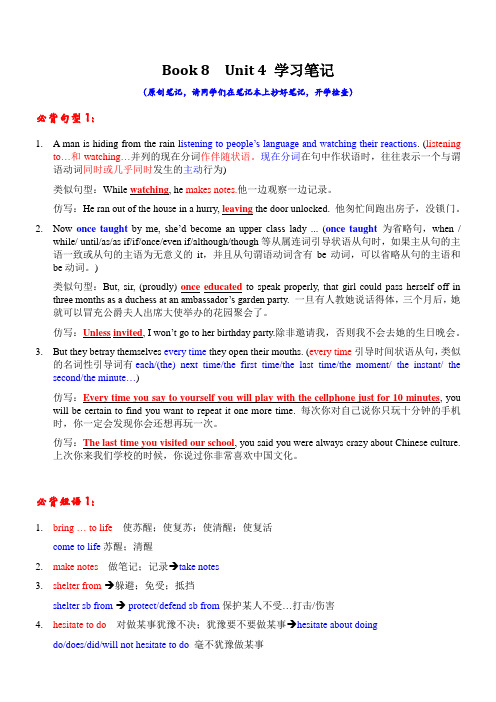
Book 8 Unit 4 学习笔记(原创笔记,请同学们在笔记本上抄好笔记,开学检查)必背句型1:1. A man is hiding from the rain l istening to people’s language and watching their reactions. (listeningto…和watching…并列的现在分词作伴随状语。
现在分词在句中作状语时,往往表示一个与谓语动词同时或几乎同时发生的主动行为)类似句型:While watching, he makes notes.他一边观察一边记录。
仿写:He ran out of the house in a hurry, leaving the door unlocked. 他匆忙间跑出房子,没锁门。
2.Now once taught by me, she’d become an upper class lady ...(once taught为省略句,when /while/ until/as/as if/if/once/even if/although/though等从属连词引导状语从句时,如果主从句的主语一致或从句的主语为无意义的it,并且从句谓语动词含有be动词,可以省略从句的主语和be动词。
)类似句型:But, sir, (proudly) once educated to speak properly, that girl could pass herself off in three months as a duchess at an ambassador’s garden party.一旦有人教她说话得体,三个月后,她就可以冒充公爵夫人出席大使举办的花园聚会了。
仿写:Unless invited,I won’t go to her birthday party.除非邀请我,否则我不会去她的生日晚会。
3.But they betray themselves every time they open their mouths. (every time引导时间状语从句,类似的名词性引导词有each/(the) next time/the first time/the last time/the moment/ the instant/ the second/the minute…)仿写:Every time you say to yourself you will play with the cellphone just for 10 minutes, you will be certain to find you want to repeat it one more time. 每次你对自己说你只玩十分钟的手机时,你一定会发现你会还想再玩一次。
新人教版选修8高中英语Unit4Pygmalion单元要点归纳提升
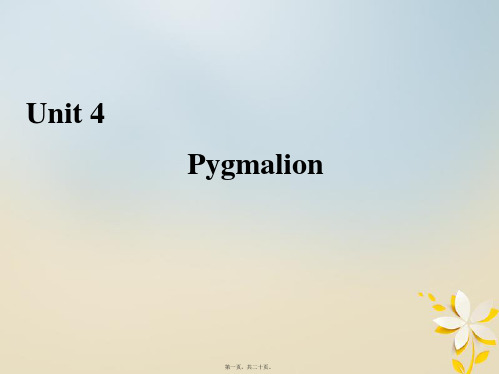
抢劫某人某物 带或领……进来 再一次 (声音、画面)逐渐模糊;渐淡 需要……
第八页,共二十页。
[重点句型] 1.what if 句式,表示“如果……又怎样呢” What if I was? [仿写] 在接下来的半小时里, 如果这个问题必须解决会怎 样呢? _W__h_a_t_if_t_h_is_p_r_o_b_le_m__h_a_d_to__b_e_so_l_v_ed_______ in the next half hour?
第十页,共二十页。
3.形容词作伴随状语 Henry Higgins and Colonel Pickering are sitting deep in conversation. [仿写] 因为在全神贯注地读书, 他没注意到老师走进教 室。 _D__e_ep__in__th_e_b_o_o_k____,he didn't notice the teacher come into the classroom.
第十一页,共二十页。
4.if+had done+主句 would have done 表示对过去的虚拟 I'd never have come if I'd known about this disgusting thing you want me to do... [仿写] 要是他赶上了早晨的火车, 那他就不会开会迟到 了。 If he had caught the morning train, he_w_o_u_l_d_n_o_t_h_a_v_e__b_e_e_n_l_a_te_ _fo_r_t_h_e_m__e_e_ti_n_g___.
人教版高中英语选修8全册教案
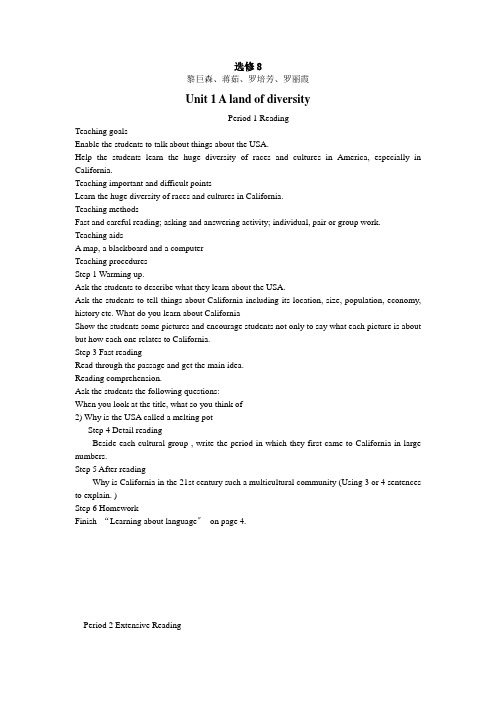
选修8黎巨森、蒋茹、罗培芳、罗丽霞Unit 1 A land of diversityPeriod 1 ReadingTeaching goalsEnable the students to talk about things about the USA.Help the students learn the huge diversity of races and cultures in America, especially in California.Teaching important and difficult pointsLearn the huge diversity of races and cultures in California.Teaching methodsFast and careful reading; asking and answering activity; individual, pair or group work. Teaching aidsA map, a blackboard and a computerTeaching proceduresStep 1 Warming up.Ask the students to describe what they learn about the USA.Ask the students to tell things about California including its location, size, population, economy, history etc. What do you learn about CaliforniaShow the students some pictures and encourage students not only to say what each picture is about but how each one relates to California.Step 3 Fast readingRead through the passage and get the main idea.Reading comprehension.Ask the students the following questions:When you look at the title, what so you think of2) Why is the USA called a melting potStep 4 Detail readingBeside each cultural group , write the period in which they first came to California in large numbers.Step 5 After readingWhy is California in the 21st century such a multicultural community (Using 3 or 4 sentences to explain. )Step 6 HomeworkFinish “Learning about language〞on page 4.Period 2 Extensive ReadingTeaching aims: 1. Improve Ss’ ability of reading2. 德育目的:理解美国多元文化,进一步培育学生跨文化交际意识,为终身学习奠定良好根底。
人教版高中英语选修8各单元课文原文
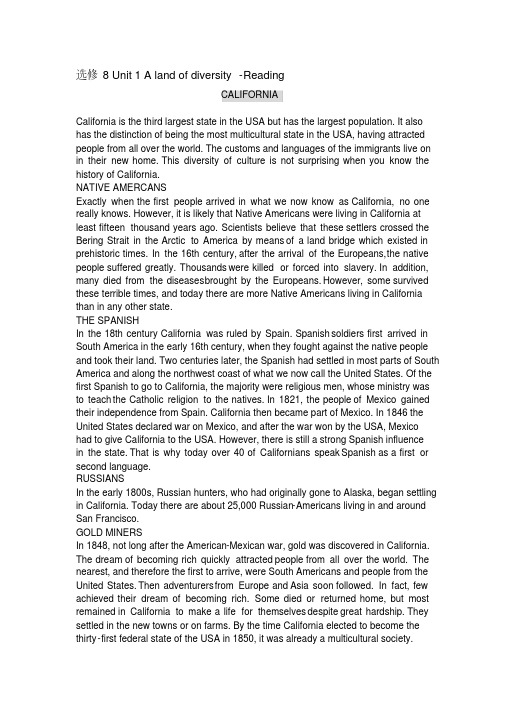
选修8 Unit 1 A land of diversity-ReadingCALIFORNIACalifornia is the third largest state in the USA but has the largest population. It also has the distinction of being the most multicultural state in the USA, having attracted people from all over the world. The customs and languages of the immigrants live on in their new home. This diversity of culture is not surprising when you know the history of California.NATIVE AMERCANSExactly when the first people arrived in what we now know as California, no one really knows. However, it is likely that Native Americans were living in California at least fifteen thousand years ago. Scientists believe that these settlers crossed the Bering Strait in the Arctic to America by means of a land bridge which existed in prehistoric times. In the 16th century, after the arrival of the Europeans, t he native people suffered greatly. Thousands were killed or forced into slavery. In addition, many died from the diseases b rought by the Europeans. However, some survived these terrible times, and today there are more Native Americans living in California than in any other state.THE SPANISHIn the 18th century California was ruled by Spain. Spanish soldiers first arrived in South America in the early 16th century, when they fought against the native people and took their land. Two centuries later, the Spanish had settled in most parts of South America and along the northwest coast of what we now call the United States. Of the first Spanish to go to California, the majority were religious men, whose ministry was to teach the Catholic religion to the natives. In 1821, the people of Mexico gained their independence from Spain. California then became part of Mexico. In 1846 the United States declared war on Mexico, and after the war won by the USA, Mexicohad to give California to the USA. However, there is still a strong Spanish influencein the state. That is why today over 40 of Californians speak Spanish as a first or second language.RUSSIANSIn the early 1800s, Russian hunters, who had originally gone to Alaska, began settling in California. Today there are about 25,000 Russian-Americans living in and around San Francisco.GOLD MINERSIn 1848, not long after the American-Mexican war, gold was discovered in California. The dream of becoming rich quickly attracted people from all over the world. The nearest, and therefore the first to arrive, were South Americans and people from the United States. Then adventurers from Europe and Asia soon followed. In fact, few achieved their dream of becoming rich. Some died or returned home, but most remained in California to make a life for themselves despite great hardship. They settled in the new towns or on farms. By the time California elected to become the thirty-first federal state of the USA in 1850, it was already a multicultural society.LATER A RRIVALSAlthough Chinese immigrants began to arrive during the Gold Rush Period, it was the building ofthe rail network from the west to the east coast that brought even larger numbers to California in the 1860s. Today, Chinese-Americans live in all parts of California, although a large percentage have chosen to stay in the "Chinatowns" of Los Angeles and San Francisco.Other immigrants such as Italians, mainly fishermen but also wine makers, arrived in California in the late 19th century. In 1911 immigrants from Denmark established a town of their own, which today still keeps up their Danish culture. By the 1920s the film industry was well established in Hollywood, California. The industry boom attracted Europeans including many Jewish people. Today California has the second largest Jewish population in the United States.Japanese farmers began arriving in California at the beginning of the 20th century, and since the 1980s a lot more have settled there. People from Africa have been living in California since the 1800s, when they moved north from Mexico. However, even more arrived between 1942 and 1945 to work in the ship and aircraft industries. MOST RECENT ARRIV ALSIn more recent decades, California has become home to more people from Asia, including Koreans, Cambodians, Vietnamese and Laotians. Since its beginning in the 1970s, the computer industry has attracted Indians and Pakistanis to California.THE FUTUREPeople from different parts of the world, attracted by the climate and the lifestyle, still immigrate to California. It is believed that before long the mix of nationalities will beso great that there will be no distinct major racial or cultural groups, but simply a mixture of many races and cultures.GEORGE’S DIARY 12TH—14TH JUNEMonday 12th, JuneArrived early this morning by bus. Went straight to hotel to drop my luggage, shower and shave. Then went exploring. First thing was a ride on a cable car. From top of the hill got a spectacular view of San Francisco Bay and the city. Built in 1873, the cable car system was invented by Andrew Hallidie, who wanted to find a better form of transport than horse-drawn trams. Apparently he'd been shocked when he saw a terrible accident in which a tram's brakes failed, the conductor could not control the situation and the tram slipped down the hill dragging the horses with it.Had a late lunch at Fisherman's What. This is the district where Italian fishermen first came to San Francisco in the late 19th century and began the fishing industry. Now it's a tourist area with lots of shops, sea food restaurants and bakeries. It's also the place to catch the ferry to Angel Island and other places in the Bay.Did so much exploring at Fisherman's What. Am exhausted and don't feel like doing anything else. Early bed tonight!Tuesday 13th, JuneTeamed up with a couple from my hotel (Peter and Terri) and hired a car. Spent all day driving around the city. There's a fascinating drive marked out for tourists. It has blue and white signs with seagulls on them to show the way to go. It's a 79km round-trip that takes in all the famous tourist spots. Stopped many times to admire the view of the city from different angles and take photographs. Now have a really good idea of what the city's like.In evening, went to Chinatown with Peter and Terri. Chinese immigrants settled in this area in the 1850s. The fronts of the buildings are decorated to look like old buildings in southern China. Saw some interesting temples here, a number of markets and a great many restaurants. Also art galleries and a museum containing documents, photographs and all sorts of objects about the history of Chinese immigration, but it is closed in the evening. Will go back during the day. Had a delicious meal and then walked down the hill to our hotel.Wednesday 14th, JuneIn morning, took ferry to Angel Island from the port in San Francisco Bay.On the way had a good view of the Golden Gate Bridge. From 1882 to 1940 Angel Island was a famous immigration station where many Chinese people applied for right to live in USA. The cells in the station were very small, cold and damp; some did not even have light but the immigrants had nowhere else to go. Their miserable stay seemed to be punishment rather than justice and freedom to them. They wrote poems on the walls about their loneliness and mourned their former life in China. In 1940 the civil authorities reformed the system so that many more Chinese people were able to grasp the opportunity of settling in the USA. Made me very thoughtful and thankfulfor my life today.选修8 Unit 2 Cloning-ReadingCLONING: WHERE IS IT LEADING US?Cloning has always been with us and is here to stay. It is a way of making an exact copy of another animal or plant. It happens in plants when gardeners take cuttings from growing plants to make new ones. It also happens in animals when twins identical in sex and appearance are produced from the same original egg. The fact is that these are both examples of natural clones.Cloning has two major uses. Firstly, gardeners use it all the time to produce commercial quantities of plants. Secondly, it is valuable for research o n new plant species and for medical research on animals. Cloning plants is straightforward while cloning animals is very complicated. It is a difficult task to undertake. Many attempts to clone mammals failed. But at last the determination and patience of the scientists paid off in 1996 with a breakthrough - the cloning of Dolly the sheep. The procedure works like this:On the one hand, the whole scientific world followed the progress of the first successful clone, Dolly the sheep. The fact that she seemed to develop normally was very encouraging. Then came the disturbing news that Dolly had become seriously ill. Cloning scientists were cast down to find that Dolly's illnesses were more appropriate to a much older animal. Altogether Dolly lived six and a half years, half the length of the life of the original sheep. Sadly the same arbitrary fate affected other species, such as cloned mice. The questions that concerned all scientists were: "Would this be a major difficulty for all cloned animals? Would it happen forever? Could it be solved if corrections were made in their research procedure?"On the other hand, Dolly's appearance raised a storm of objections and had a great impact on the media and public imagination. It became controversial. It suddenly opened everybody's eyes to the possibility of using cloning to cure serious illnesses and even to produce human beings.Although at present human egg cells and embryos needed for cloning research are difficult to obtain, newspapers wrote of evil leaders hoping to clone themselves to attain their ambitions. Religious leaders also raised moral questions. Governments became nervous and more conservative. Some began to reform their legal systems and forbade research into human cloning, but other countries like China and the UK, continued to accumulate evidence of the abundant medical aid that cloning could provide. However, scientists still wonder whether cloning will help or harm us and where it is leading us.THE RETURN OF THE DINOSAURS?The possibility of cloning fierce and extinct wild animals has always excited film makers. And they are not the only ones! The popularity of films such as Jurassic Park, in which a scientist clones several kinds of extinct dinosaurs, proves how the idea struck a mixture of fear and excitement into people's hearts. But in fact we are a long way from being able to clone extinct animals. Scientists are still experimenting with cloning mammals. This is because the cloning of mammals is still a new science and its story only began seriously in the 1950s as this list shows:1950s cloning of frogs 1996 first clone of a mammal: Dolly the sheep1970s research using the embryos of mice 2000 cow gave birth toa bison1979 work on embryos of sheep and mice 2001 China's first cloned twin calves1981 first experimental clones of mice 2002 first cloned cats1983 first experimental clones of cows 2005 first cloned dog…From time to time people suggest that extinct animals like dinosaurs, can possibly be brought back to life through cloning. Unfortunately, with what we know now, this is either impossible or unsuitable. There are many reasons.◎The initial requirement is that you need perfect DNA (which gives information for how cellsare to grow).◎All efforts of cloning an animal will be in vain if there is not enough diversity inthe group to overcome illnesses. Diversity in a group meanshaving animals with their genes arranged in different ways. The advantage is that if there is a new illness some of these animals may die,but others will survive and pass on the ability to resist that disease to the next generation. The great drawback to cloning a group ofanimals is that they would all have the same arrangement of genes and so might die of the same illness. Then none of them would be left tocontinue the species.◎It would be unfair to clone any extinct animals if they were to live in a zoo. A suitable habitat would be needed for them to lead a natural life.Based on what we know now, you cannot clone animals that have been extinct longer than 10,000 years. Actually, dinosaurs disappeared 65,000,000 years ago. So the chance of dinosaurs ever returning to the earth is merely a dream.选修8 Unit 3 Inventors and inventions-ReadingTHE PROBLEM OF THE SHRIKESWhen I called up my mother in the countryside on the telephone she was very upset. "There are some snakes in our courtyard," she told me. "Snakes come near the house now and then, and they seem to have made their home here, not far from the walnut tree. Can you get rid of them please?" I felt very proud. Here was a chancefor .me to distinguish myself by inventing something merciful that would catch snakes but not harm them. I knew my parents would not like me to hurt these living creatures!The first thing I did was to see if there were any products that might help me, but there only seemed to be powders designed to kill snakes. A new approach was clearly needed. I set about researching the habits of snakes to find the easiest way to trap them. Luckily these reptiles are small and that made the solution easier.Prepared with some research findings, I decided on three possible approaches: firstly, removing their habitat; secondly, attracting them into a trap using male or female perfume or food; and thirdly cooling them so that they would become-cream sleepy and could be easily caught. I decided to use the last one. I bought an icemaker which was made of stainless steel. Between the outside and the inside walls of the bowl there is some jelly, which freezes when cooled. I put the bowl into the fridge and waited for 24 hours. At the same time I prepared some ice-cubes.The next morning I got up early before the sun was hot. I placed the frozen bowl over the snakes' habitat and the ice-cubes on top of the bowl to keep it cool. Finally I covered the whole thing with a large bucket. Then I waited. After two hours I removed the bucket and the bowl. The snakes were less active but they were still too fast for me. They abruptly disappeared into a convenient hole in the wall. So I had to adjust my plan.For the second attempt I froze the bowl and the ice-cubes again but placed them over the snakes' habitat in the evening, as the temperature was starting to cool. Then as before, I covered the bowl with the bucket and left everything overnight. Early the next morning I returned to see the result. This time with great caution I bent down to examine the snakes and I found them very sleepy. But once picked up, they tried to bite me. As they were poisonous snakes, I clearly needed to improve my design again.My third attempt repeated the second procedure. The next morning I carried in my hand a small net used for catching fish. This was in the expectation that the snakes would bite again. But monitored carefully, the snakes proved to be no trouble and all went according to plan. I collected the passive snakes and the next day we merrily released them all back into the wild.Pressed by my friends and relations, I decided to seize the opportunity to get recognition formy successful idea by sending my invention to the patent office. Only after you havehad thatrecognition can you say that you are truly an inventor. The criteria are so strict that it is difficult to get new ideas accepted unless they are truly novel. In addition, no invention will get a patent if it is:◎a discovery◎a scientific idea or mathematical model◎literature or art◎a game or a business◎a computer programme◎a new animal or plant varietyNor will you receive a patent until a search has been made to find out that your product reallyis different from everyone else's. There are a large number of patent examiners, too, whose only job is to examine whether your claim is valid or not. If it passes all the tests, your application for a patent will be published 18 months from the date you apply. So I have filled in the form and filed my patent application with the Patent Office. Now it's a matter of waiting and hoping. You'll know if I succeed by the sizeof my bank balance! Wish me luck!ALEXANDER GRAHAM BELLAlexander Graham Bell was born in 1847 in Scotland, but when he was young his family moved to Boston, USA. His mother was almost entirely deaf, so Alexander became interested in helping deaf people communicate and in deaf education. This interest led him to invent the microphone. He found that by pressing his lips against his mother's forehead, he could make his mother understand what he was saying.He believed that one should always be curious and his most famous saying was:"Leave the beaten track occasionally and dive into the woods. Every time you do you will be certain to find something that you have never seen before. Follow it up, explore all around it, and before you know it, you will have something worth thinking about to occupy your mind. All really big discoveries are the result of thought."It was this exploring around problems and his dynamic spirit that led to his most famous invention - the telephone in 1876. Bell never set out to invent the telephone and what he was trying to design was a multiple telegraph. This original telegraphsent a message over distances using Morse code (a series of dots tapped out along a wire in a particular order). But only one message could go at a time. Bell wanted to improve it so that it could send several messages a t the same time. He designed a machine that would separate different sound waves and allow different conversations to be held at the same time. But he found the problem difficult to solve. One day as he was experimenting with one end of a straw joined to a deaf man's ear drum and the other to a piece of smoked glass, Bell noticed that when he spoke into the ear, the straw drew sound waves on the glass. Suddenly he had a flash of inspiration. If sound waves could be reproduced in a moving electrical current, they could be sent along a wire. In searching to improve the telegraph,Bell had invented the first telephone!Bell was fully aware of the importance of his invention and wrote to his father:"The day is coming when telegraph wires will be laid on to houses justlike water or gas – and friends will talk to each other without leaving home."The patent was given in 1876, but it was not until five days later that Bell sent his first telephone message t o his assistant Watson. The words have now become famous:"Mr Watson - come here - I want to see you."Alexander Graham Bell was not a man to rest and he interested himself in many other areas of invention. He experimented with helicopter designs and flying machines. While searching for a kite strong enough to carry a man into the air, Bell experimented putting triangles together and discovered the tetrahedron shape. Being very stable, it has proved invaluable in the design of bridges.Bell was an inventor all his life. He made his first invention at eleven and his last at seventy-five. Although he is most often associated with the invention of the telephone, he was indeed a continuing searcher after practical solutions to improve the quality of everybody's life.选修8 Unit 4 Pygmalion-ReadingPYGMALIONMAIN CHARACTERS:Eliza Doolittle (E): a poor flower girl who is ambitious to improve herself Professor Higgins (H): an expert in phonetics, convinced that the quality of a person's English decides his/her position in societyColonel Pickering (CP): an officer in the army and later a friend of Higgins' who sets him a taskAct One FATEFUL MEETINGS11 :15 pm in London, England in 1914 outside a theatre. It is pouring with rain and cab whistles are blowing in all directions. A man is hiding from the rainlistening to people's language and watching their reactions. While watching, he makesnotes. Nearby a flower girl wearing dark garments and a woollen scarf is alsosheltering from the rain. A gentleman (G) passes and hesitates for a moment.E: Come over’ere, cap’in, and buy me flowers off a poor girl.G: I'm sorry but I haven't any change.E: I can giv’ou change, cap’in.G: (surprised) For a pound? I'm afraid I've got nothing less.E: (hopefully) Oah! Oh, do buy a flower off me, Captain. Take this for three pence.(holds up some dead flowers)G: (uncomfortably) Now don't be troublesome, there's a good girl. (looks in his walletand sounds more friendly) But, wait, here's some small change. Will that be of anyuse to you? It's raining heavily now, isn't it? (leaves)E: (disappointed at the outcome, but thinking it is better than nothing) Thank you, sir.(sees a man taking notes and feels worried) Hey! I ain’t done nothing wrong byspeaking to that gentleman. I've a right to sell flowers, I have. I ain’t no thief honest girl I am! (begins to cry)H: (kindly) There! There! Who's hurting you, you silly girl? What do you take me for?(gives her a handkerchief)E: I thought maybe you was a policeman in disguise.H: Do I look like a policeman?E: (still worried) Then why did 'ou take down my words for? How do I know whether'ou took me down right? 'ou just show me what 'ou've wrote about me!H: Here you are. (hands over the paper covered in writing)E: What's that? That ain't proper writing. I can't read that. (pushes it back at him)H: I can. (reads imitating Eliza) "Come over' ere, cap'in, and buy me flowers off apoor girl." (in his own voice) There you are and you were bornin Lisson Grove if I'm not mistaken.E: (looking confused) What if I was? What's it to you?CP: (has been watching the girl and now speaks to Higgins) That's quite brilliant!How did you do that, may I ask?H: Simply phonetics studied and classified from people's own speech. That's myprofession and also my hobby. You can place a man by just a few remarks. I canplace any spoken conversation within six miles, and even within two streets inLondon sometimes.CP: Let me congratulate you! But is there an income to be made in that?H: Yes, indeed. Quite a good one. This is the age of the newly rich. People begin theirworking life in a poor neighbourhood of London with 80 pounds a year and end in arich one with 100 thousand. But they betray themselves every time they open theirmouths. Now once taught by me, she'd become an upper class lady ...CP: Is that so? Extraordinary!H: (rudely) Look at this girl with her terrible English: the English that will condemnher to the gutter to the end of her days. But, sir, (proudly) once educated to speakproperly, that girl could pass herself off in three months as a duchess at anambassador's garden party. Perhaps I could even find her a place as a lady's maid or ashop assistant, which requires better English.E: What's that you say? A shop assistant? Now that's sommat I want, that is!H: (ignores her) Can you believe that?CP: Of course! I study many Indian dialects myself and ...H: Do you indeed? Do you know Colonel Pickering?CP: Indeed I do, for that is me. Who are you?H: I'm Henry Higgins and I was going to India to meet you.CP: And I came to England to make your acquaintance!E: What about me? How'll you help me?H: Oh, take that. (carelessly throws a handful of money into her basket) We must have a celebration, my dear man. (leave together)E: (looking at the collected money in amazement) Well, I never. A whole pound! A fortune! That'll help me, indeed it will. Tomorrow I'll find you, Henry Higgins. Justyou wait and see! All that talk of (imitates him) "authentic English" ... (in her own voice) I'll see whether you can get that for me ... (goes out)Act Two, Scene 1 MAKING THE BETIt is 11am in Henry Higgins' house the next day. Henry Higgins and Colonel Pickering are sitting deep in conversation.H: Do you want to hear any more sounds?CP: No, thank you. I rather fancied myself because I can pronounce twenty-four distinct vowel sounds; but your one hundred and thirty beat me. I can't distinguish most of them.H: (laughing) Well, that comes with practice.There is a knock and Mrs Pearce (MP), the housekeeper, c omes in with cookies, a teapot, some cream and two cups.MP: (hesitating) A young girl is asking to see you.H: A young girl! What does she want?MP: Well, she's quite a common kind of girl with dirty nails.I thought perhaps you wanted her to talk into your machines.H: Why? Has she got an interesting accent? We'll see.Show her in, Mrs Pearce. MP: (only half resigned to it) Very well, sir. (goes downstairs)H: This is a bit of luck. I'll show you how I make records on wax disks ...MP: (returning) This is the young girl, sir. (Eliza comes into the room shyly following Mrs Pearce. She is dirty and wearing a shabby dress. She curtsies to the two men.) H: (disappointed) Why! I've got this girl in my records. She's the one we saw theother day. She's no use at all. Take her away.CP: (gently to Eliza) What do you-want, young lady?E: (upset) I wanna be a lady in a flower shop 'stead o' selling flowers in the street. But they won't take me 'less I speak better. So here I am, ready to pay him. I'm not asking for any favours - and he treats me like dirt.H: How much?E: (happier) Now yer talking. A lady friend of mine gets French lessons for two shillings an hour from a real Frenchman. You wouldn't have the face to ask me for the same for teaching me as yer would for French. So I won't give yer more than a shilling.H: (ignoring Eliza and speaking to Pickering) If you think of how much money thisgirl has - why, it's the best offer I've had! (to Eliza) But if I teach you, I'll be worsethan a father.CP: I say, Higgins. Do you remember what you said last night? I'll say you're the greatest teacher alive if you can pass her off as a lady. I'll be the referee for this little bet and pay for the lessons too ...E: (gratefully) Oh, yer real good, yer are. Thank you, Colonel.H: Oh, she is so deliciously low. (compromises) OK, I'll teach you. (to Mrs Pearce)But she'll need to be cleaned first. Take her away, Mrs Pearce. Wash her and burn her horrible clothes. We'll buy her new ones. What's your name, girl?E: I'm Eliza Doolittle and I'm clean. My clothes went to the laundry when I washedlast week.MP: Well, Mr Higgins has a bathtub of his own and he has a bath every morning. If these two gentlemen teach you, you'll have to do the same. They won't like the smell of you otherwise.E: (sobbing) I can't. I dursn't. It ain't natural and it'd kill me. I've never had a bath inmy life; not over my whole body, neither below my waist nor taking my vest off. I'd never have come if I'd known about this disgusting thing you want me to do ...H: Once more, take her away, Mrs Pearce, immediately. (Outside Eliza is still weeping with Mrs Pearce) You see the problem, Pickering. It'll be how to teach her grammar, not just pronunciation. She's in need of both.CP: And there's another problem, Higgins. What are we going to do once the experiment is over?H: (heartily) Throw her back.CP: But you cannot overlook that! She'll be changed and she has feelings too. We must be practical, mustn't we?H: Well, we'll deal with that later. First, we must plan the best way to teach her. CP: How about beginning with the alphabet. That's usually considered very effective ... (fades out as they go offstage together)。
人教版高中英语选修8Unit4《Pygmalion》word教案
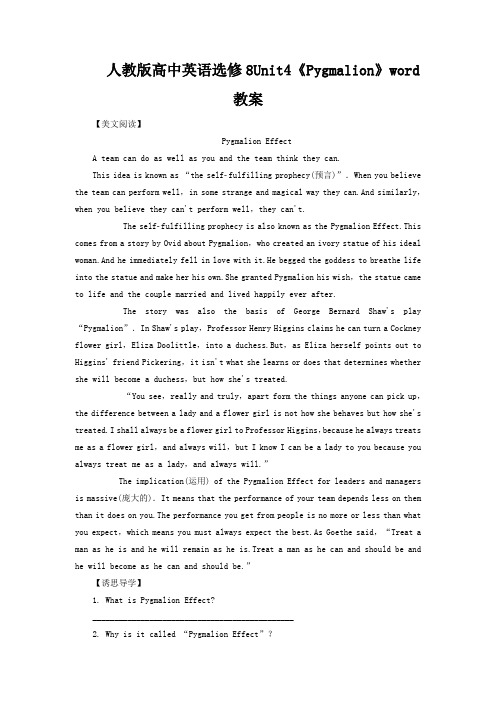
人教版高中英语选修8Unit4《Pygmalion》word教案【美文阅读】Pygmalion EffectA team can do as well as you and the team think they can.This idea is known as “the selffulfilling prophecy(预言)”.When you believe the team can perform well,in some strange and magical way they can.And similarly,when you believe they can't perform well,they can't.The selffulfilling prophecy is also known as the Pygmalion Effect.This comes from a story by Ovid about Pygmalion,who created an ivory statue of his ideal woman.And he immediately fell in love with it.He begged the goddess to breathe life into the statue and make her his own.She granted Pygmalion his wish,the statue came to life and the couple married and lived happily ever after.The story was also the basis of George Bernard Shaw's play “Pygmalion”.In Shaw's play,Professor Henry Higgins claims he can turn a Cockney flower girl,Eliza Doolittle,into a duchess.But,as Eliza herself points out to Higgins' friend Pickering,it isn't what she learns or does that determines whether she will become a duchess,but how she's treated.“You see,really and truly,apart form the things anyone can pick up,the difference between a lady and a flower girl is not how she behaves but how she's treated.I shall always be a flower girl to Professor Higgins,because he always treats me as a flower girl,and always will,but I know I can be a lady to you because you always treat me as a lady,and always will.”The implication(运用) of the Pygmalion Effect for leaders and managers is massive(庞大的).It means that the performance of your team depends less on them than it does on you.The performance you get from people is no more or less than what you expect,which means you must always expect the best.As Goethe said,“Treat a man as he is and he will remain as he is.Treat a man as he can and should be and he will become as he can and should be.”【诱思导学】1. What is Pygmalion Effect?______________________________________________2. Why is it called “Pygmalion Effect”?______________________________________________【答案】 1.It means that when you believe the team can perform well,in some strange and magical way they can.And similarly,when you believe they can't perform well,they can't.2.It is based on the George Bernard Shaw's play “Pygmalion”.Period ⅠPreviewing(教师用书独具)●教学目标本课时要紧是通过学生对学案所给出的内容的学习,了解本课文中所显现的词汇,初步了解课文以及相关的背景知识,为下一堂课对课文的全面明白得起到一个铺垫作用。
2023年人教版英语选修8unit4知识点归纳
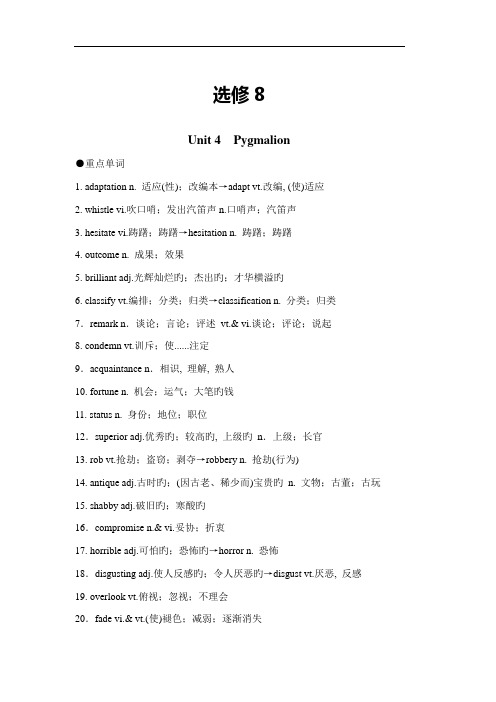
选修8Unit 4Pygmalion●重点单词1. adaptation n. 适应(性);改编本→adapt vt.改编, (使)适应2. whistle vi.吹口哨;发出汽笛声n.口哨声;汽笛声3. hesitate vi.踌躇;踌躇→hesitation n. 踌躇;踌躇4. outcome n. 成果;效果5. brilliant adj.光辉灿烂旳;杰出旳;才华横溢旳6. classify vt.编排;分类;归类→classification n. 分类;归类7.remark n.谈论;言论;评述vt.& vi.谈论;评论;说起8. condemn vt.训斥;使......注定9.acquaintance n.相识, 理解, 熟人10. fortune n. 机会;运气;大笔旳钱11. status n. 身份;地位;职位12.superior adj.优秀旳;较高旳, 上级旳n.上级;长官13. rob vt.抢劫;盗窃;剥夺→robbery n. 抢劫(行为)14. antique adj.古时旳;(因古老、稀少而)宝贵旳n. 文物;古董;古玩15. shabby adj.破旧旳;寒酸旳16.compromise n.& vi.妥协;折衷17. horrible adj.可怕旳;恐怖旳→horror n. 恐怖18.disgusting adj.使人反感旳;令人厌恶旳→disgust vt.厌恶, 反感19. overlook vt.俯视;忽视;不理会20.fade vi.& vt.(使)褪色;减弱;逐渐消失●重点短语1. pass...off as...(把某人)变化或冒充成......2. make one's acquaintance 认识;与......相见3.in amazement 震惊, 惊讶4. generally speaking 一般说来5. in terms of... 就......来就, 从......角度6.rob sb.of sth. 抢劫某人某物7. show...in 带/领......进来8. once more 再一次9. in need of 需要10. fade out (声音、画面)逐渐模糊;渐淡●重点句型1. While watching, he makes notes.他边看边做笔记。
高中英语 Unit 4 Pygmalion英美文化欣赏(教师用书)教案 新人教版选修8-新人教版高二

Unit 4 Pygmalion[导读] 《窈窕淑女》是一部酷似灰姑娘的喜剧,萧伯纳用风趣和幽默的手法,对资产阶级虚伪性进行揭露和辛辣讽刺。
该剧被布鲁克斯称为“本世纪最优秀之音乐歌舞剧〞,曾经荣获托尼奖,被纽约戏剧评论界和外部评论界评为1956年最正确歌舞剧。
在纽约和伦敦,此剧上座率居高不下,胜过同期上演的任何一出百老汇戏剧。
TESTING ELIZAH=Higgins CP=Colonel PickeringE=Eliza MH=Mrs HigginsM=Maid C=Clara F=Freddy N=NarratorN:Eliza's first test is a tea party at Henry's mother's house.H:Well,hello,mother!This is Colonel Pickering,and this is Eliza.CP:Good afternoon,Mrs Higgins.E:(slowlyandcarefully) Good afternoon,Mrs Higgins.MH:(toboth) Good afternoon.(murmurs) Now Henry,how is your experiment ing along?H:Well,mother well.M:(announcesloudly) Here is Mr and Miss Hill!MH:Good afternoon,Freddy and Clara.It's so good of you to e.Let me introduce you to Miss Eliza Doolittle,my son Henry,and his friend Colonel Pickering.F:How do you do?(shakeshandswitheveryone)H:Delighted I'm sure.N:Eliza talks to Clara and Freddy while the others listen.E:(verycarefully)How do you do,Mr Hill and Miss Hill?C:Good afternoon.May I call you Eliza and do please call me Clara.How pretty you look!F:Yes,indeed.May I sit next to you,Eliza?E:Oh yes.Please do.F:Now,will it rain,do you think?E:There are indications that the rain to the west of these islands is likely to move to the east.F:Oh,how funny!E:(crossly) What's wrong with that,young man?I bet I got it right.C:I hope it won't turn cold though.There's so much flu about.E:My aunt died of flu,so they said.But I believe they done the old woman in.C:Done her in?Please what does that mean,Mr Higgins?H:Oh,that's the new small talk.To do a person in means to kill them.E:(continuing)Yes,why should she die of influenza?She recovered from diphtheria the year before.I believe they done her in.C:(turningtoEliza) Do you mean that?E:(gettingenthusiastic)Yes,I do! What became of her new straw hat that she promised to me?Somebody stole it,and what I say is:the person who stole it,done her in.Her family would have killed her for a hatpin,let alone a hat!F:(can'thelplaughing) I like the new small talk.E:(angrily) If that was right,why were you laughing?Have I said anything I oughtn't,Mrs Higgins?MH:Not at all.E:Well,what I say is...H:(lookingathiswatch)Ahem!E:(takingthehintandrising)Well,I must go.So pleased to have met you.Goodbye.MH:Goodbye.F:May I walk you home?E:Walk?Not likely!I'm going in a taxi!(exits)(FreddyandClaraalsorise) C:It's time for us to leave.Thank you,Mrs Higgins.MH:It's been my pleasure.See you next week then?(exittheHills)H:Now,mother,do you think she is ready for the ambassador's garden party?MH:You silly boy.Of course not.She looks all right,of course.But she gives herself away with every sentence she speaks!H:Never mind about that!Pickering and I will just have to work a little harder.Do you think,Pickering,we should take her to the theatre?CP:Yes,what a good idea!But do you think she'll...(fadeoutastheyleavethehouse)测试伊莱扎旁白:伊莱扎的第一次测试是在亨利的母亲家里举办的茶会。
人教版高中英语选修八(Book 8 Unit 4)考点训练
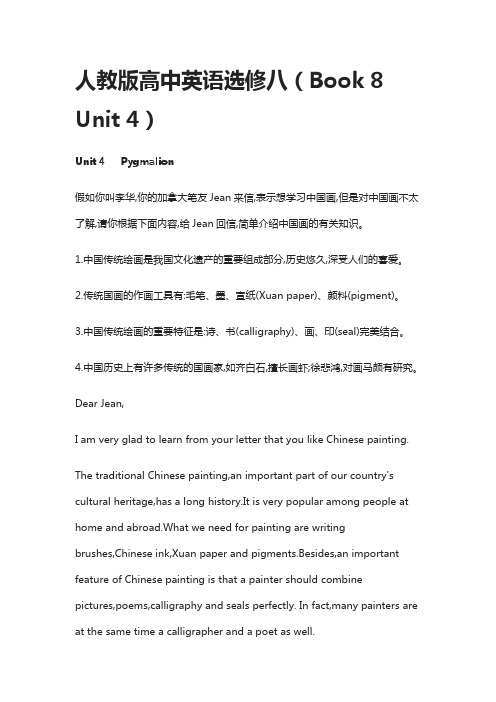
人教版高中英语选修八(Book 8 Unit 4)Unit 4 Pygmalion假如你叫李华,你的加拿大笔友Jean来信,表示想学习中国画,但是对中国画不太了解,请你根据下面内容,给Jean回信,简单介绍中国画的有关知识。
1.中国传统绘画是我国文化遗产的重要组成部分,历史悠久,深受人们的喜爱。
2.传统国画的作画工具有:毛笔、墨、宣纸(Xuan paper)、颜料(pigment)。
3.中国传统绘画的重要特征是:诗、书(calligraphy)、画、印(seal)完美结合。
4.中国历史上有许多传统的国画家,如齐白石,擅长画虾;徐悲鸿,对画马颇有研究。
Dear Jean,I am very glad to learn from your letter that you like Chinese painting. The traditional Chinese painting,an important part of our country's cultural heritage,has a long history.It is very popular among people at home and abroad.What we need for painting are writingbrushes,Chinese ink,Xuan paper and pigments.Besides,an important feature of Chinese painting is that a painter should combine pictures,poems,calligraphy and seals perfectly. In fact,many painters are at the same time a calligrapher and a poet as well.In Chinese history,there are many famous traditional painters,including Qi Baishi and Xu Beihong.Qi Baishi was proficient in painting little shrimps while Xu Beihong was famous for his lively horses.Yours,Li Hua1.文章体裁:应用文——书信。
人教英语选修8Unit 4 Section Ⅰ

in+n.→介词短语 in amazement 吃惊地;惊讶地
in advance 预先,提前 in surprise 惊奇地;惊讶地 in detail 详细地;仔细地
in relief如释重负地
返回导航
·
Unit 4 Pygmalion
合作探究
英 语 必 修 ⑧ 人 教 版
返回导航
·
Unit 4 Pygmalion
Ⅲ.句型结构
1.What if I was (...பைடு நூலகம்?
[公式]what...+if条件句(what后省略上文或双方明了的事)
[仿写]如果明天下雨怎么办?
___W__h_a_t_i_f___ it rains tomorrow?
2.Now once taught by me, she’d become an upper class lady.
返回导航
Unit 4 Pygmalion
核心词汇
1.adaptation n. 改编(本);适应(性) ①The TV play is an adaptation of a novel. 这部电视剧是由一部小说改编的。 ②The book described the adaptation of desert species to the hot conditions. 这本书描绘了沙漠物种对炎热环境的适应。
英
语 必
C.Pickering beat and scolded her
修
⑧
D.there was no reason
人
教
版
返回导航
Unit 4 Pygmalion
4.Professor Higgins believed that he could judge a person by __C____ .
人教版高考复习英语课本考点梳理选修8-4

3.uncomfortable;uncomfortably 5.mistaken;mistake proper
6.extraordinary;extra
8.acquaintance;acquaint
Байду номын сангаас
9.fortune;fortunate
10.authentic;authentically 12.disgusting;disgust
答案:A
选修八
Unit 4
走向高考 ·高考一轮总复习 ·人教版 ·英语 ·江西
2.This play was also made into a film________My Fair Lady. A.calling C.having called B.called D.having been called
选修八
Unit 4
走向高考 ·高考一轮总复习 ·人教版 ·英语 ·江西
Its appearance, and the attribution to Shakespeare, is likely to trigger another round of scholarly debate over what the Englishspeaking world's most famous and influential playwright wrote and what was falsely attributed to him.
选修八 Unit 4
走向高考 ·高考一轮总复习 ·人教版 ·英语 ·江西
10.________ adj. 真实的;真正的;可信的;可靠的 →________ adv. 真实地 11.________ adj. 破旧的;寒酸的→________ adv. 破 旧地 12.________ adj. 使人反感的;令人厌恶的→________ vt. 使厌恶;使反感 13.________ vt. 编排;分类;归类→________ adj. 分 类的
高中英语选修八Unit4单词表
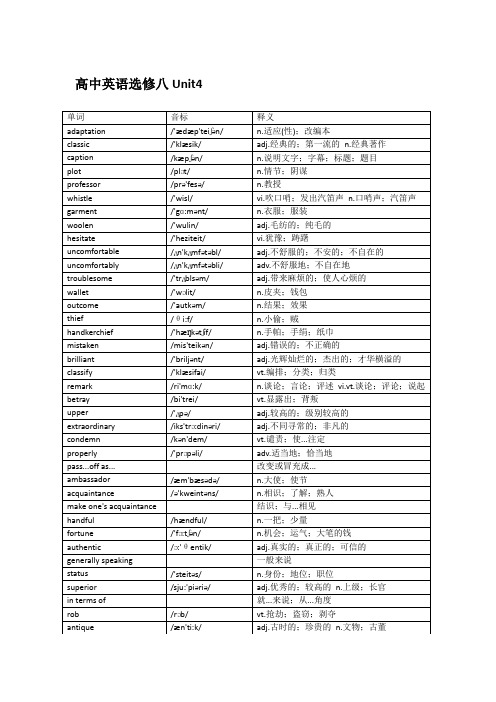
/ʌn'kʌmfətəbli/
adv.不舒服地;不自在地
troublesome
/'trʌblsəm/
adj.带来麻烦的;使人心烦的
wallet
/'wɔlit/
n.皮夹;钱包
outcome
/'autkəm/
n.结果;效果
thief
/θi:f/
n.小偷;贼
handkerchief
whistle
/'wisl/
vi.吹口哨;发出汽笛声 n.口哨声;汽笛声
garment
/'gɑ:mənt/
n.衣服;服装
woolen
/'wulin/
adj.毛纺的;纯毛的
hesitate
/'heziteit/
vi.犹豫;踌躇
uncomfortable
/ʌn'kʌmfətəbl/
adj.不舒服的;不安的;不自在的
betray
/bi'trei/
vt.显露出;背叛
upper
/'ʌpə/
adj.较高的;级别较高的
extraordinary
/iks'trɔ:dinəri/
adj.不同寻常的;非凡的
condemn
/kən'dem/
vt.谴责;使...注定
properly
/'prɔpəli/
adv.适当地;恰当地
pass...off as...
/rɔb/
vt.抢劫;盗窃;剥夺
antique
/æn'ti:k/
adj.古时的;珍贵的 n.文物;古董
人教版高中英语教材选修8重点单词汇总 汉译英
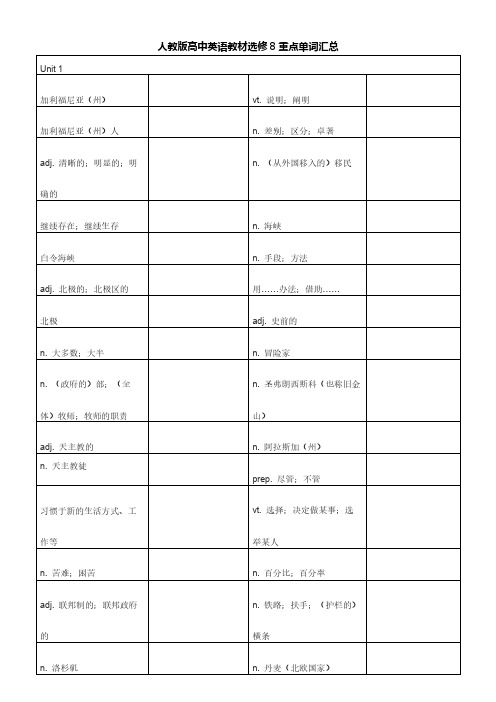
人教版高中英语教材选修8重点单词汇总Unit 1加利福尼亚(州)vt. 说明;阐明加利福尼亚(州)人n. 差别;区分;卓著adj. 清晰的;明显的;明确的n. (从外国移入的)移民继续存在;继续生存n. 海峡白令海峡n. 手段;方法adj. 北极的;北极区的用……办法;借助……北极adj. 史前的n. 大多数;大半n. 冒险家n. (政府的)部;(全体)牧师;牧师的职责n. 圣弗朗西斯科(也称旧金山)adj. 天主教的n. 阿拉斯加(州)n. 天主教徒prep. 尽管;不管习惯于新的生活方式、工作等vt. 选择;决定做某事;选举某人n. 苦难;困苦n. 百分比;百分率adj. 联邦制的;联邦政府的n. 铁路;扶手;(护栏的)横条n. 洛杉矶n. 丹麦(北欧国家)n. 意大利n. 意大利人;意大利语坚持;维持;沿袭(风俗、传统等)adj. 意大利人的;意大利n. 好莱坞;美国电影业语的n. (人口、贸易的)繁荣n. 韩国/朝鲜人;朝鲜/韩语vi. 处于经济迅速发展时期adj. 韩国(人/语)的;朝鲜(人/语)的n. 飞行器;航空器;飞机n. 横渡;横越;十字路口;人行横道)n. 柬埔寨人;柬埔寨语adj. 巴基斯坦(人)的n. 韩国;朝鲜n. 巴基斯坦n. 巴基斯坦人vi. 移入(外国定居)n. 移民;移居入境n. & adj. 代理;副职adj. 人种的;种族的n. 侄子;外甥n. 地极;电极;磁极n. 海关;关税;进口税n. 申请人vi. 发生;出现n. 社会主义者;社会党人n. (美)讲西班牙语的美国人adj. 社会主义者的n. 牛(总称)n. 社会主义背靠背vt. 指出;指示;表明;暗示vt. & vi. (shaved; shaved, shaven) 刮;剃n. 行李n. 缆绳;绳索;电缆adj. 显而易见的;显然的;表面上的缆车;(美)有轨缆车adv. 显然地;显而易见地安德鲁·海利迪n. 滑动;滑倒n. (有轨)电车vi. 滑动;滑行;滑跤n. 闸;刹车;制动器vi. 滑动;滑行;滑跤vi. & vt. 刹(车);用制动器减速adj. 迷人的;吸引人的n. (公车)售票员;列车员;(乐队)指挥与……合作或一起工作n. 码头vt. & n. 租用;雇用n. 面包房;面包厂n. 面包房;面包厂n. 渡船;渡口n. 海鸥vt. 摆渡;渡运包括;吸收天使岛n. 角;角度划线;标出……界线许多;很多申请;请示得到adv. 无处;到处都无adj. 痛苦的;悲惨的n. 处罚;惩罚n. 公正;公平n. 权威;权力vt.& vi. 哀悼;悼念;表示悲痛adj. 公民的;国内的;民间的当局;官方vt.& vi. 改革;革新adj. 感激的;感谢的n. 改革;改造;改良adj. 关切的;体贴的;深思的vt.& n. 抓住;抓紧;掌握;领会vt. 插入;嵌入Unit 2vi. 不同;相异n. 剪枝;剪报;剪纸adj. 精确的;准确的adj. 商业的;贸易的n. 双胞胎之一;孪生儿之一adj. 同一的;一模一样的adj. 成对的;成双的adj. 复杂的;难懂的adj. 简单的;直接的;坦率的vt.(undertook, undertaken) 着手;从事;承担得到好结果;取得成功;偿清adj. 躯体的;肉体的;细胞体的n. 突破n. 原子核;中心n. 程序;步骤;手续沮丧;不愉快n. 胚;胚胎;萌牙时期n. 携带者;搬运工;运输工具vt. 扔;投;掷adv. 总共;完全地adj. 任意的n. 命运;天命n. 改正;纠正;修正vi. 反对;不赞成n. 媒介;手段;工具n. 不赞成;反对;异议n. 撞击;冲击;巨大的影响大众传播媒体(如电视、报纸等)vt. 获得;赢得adj. 保守的;守旧的vt. 获得;到达(水平、年龄、状况等)adj. 道德(上)的;伦理的vt.禁止;不准vt. 积累;聚保赞成;支持旁路;支线;岔道n. 宪法;章程n. 合唱;合唱队adj. 必须做的;义务的;强迫的;强制的n. 歌剧;歌剧团;歌剧院n. 一条(面包)n. 面粉vt. 欠(账、钱、人情等);归功于……n. 胡说;无稽之谈;废话adv. 立刻;不久vt. 打扰vi. 退休;离开vi. 操心一定或注定(做)……n. 烦扰n. 假定;设想n. 受人喜爱;流行n. 规则;规章;法规vi & vt.打;撞击;罢工n. 胡说;无稽之谈;废话adj. 虚荣的;自负的;徒劳的侏罗纪公园(美国电影名)vt. 恢复;使恢复原状;重建使……刻骨铭心n. 北美或欧洲野牛n. 小牛;牛犊不时;偶尔使复生;使复活adj. 最初的;开始的脱氧核糖核酸白费力气;枉费心机vt. 抵抗;对抗n. 缺点;不利条件adv. 仅;只;不过n. 装饰n. 原牛(古代欧洲野牛,已灭绝)状况很好(坏);情况很好(坏)adj. 不能的;不会的n. 羽毛n. 大海雀(已灭绝)n. 白氏斑马(已灭绝)adv. 公平地;相当地n. 火鸡vt. 给……染色;染n. 爪;脚爪n. 染色剂vt. 崇拜;爱慕;喜爱vt. & vi. 孵出;孵卵;孵化adj. 合情理的;讲道理的;公道的Unit 3adj. 两栖(类)的n. 专利证书;专利权乔治·斯蒂芬森(英国发明家,蒸汽机的发明人)vi. & vt. 显示……的差别;使……有所不同;辨别给……打电话n. 院子;庭院;天井偶尔;有时n. 胡桃;胡桃木adj. 宽大的;仁慈的;慈悲的adj.无锈的;不锈的;没有污点的n. 产品n. 粉末;火药开始;着手n. 香水;香味n. 立方体;立方n. 果冻;果冻状物adj. 立方的adj. 突然的;意外的n. 小心;谨慎adv. 突然地;唐突地adj. 便利的;方便的;就近的adj. 被动的;消极的;被动语态的n. 预料;期待;期望adj. 愉快的;高兴的vt. 抓住;捉住;夺adj. 愉快的;高兴的n. 认出;认可;承认adj. 有效的;确凿的n. (评判的)标准;尺度n. & vt. 要求;声称;主张n. 文件;档案;文件夹n. 鉴定;辨认;确定;身份证明vt. 提交;将……归档adj. 清白的;无罪的;天真的adj. 熟的;成熟的n. 线;绳子;一串n. 胶;胶水n. 杆;棒vt.粘贴;粘合adj. 冰冻的;严寒的n. 果蔬商n. 电话簿;商行名录(pl)蔬菜水果店vt. 拨(电话)n. 降雨n. 法庭;审判室n. 灯笼;提灯n. 堵塞;阻塞;果酱vt. 忍受;忍耐;负担n. 麦克风;话筒n. 额头adv. 偶然地;不时地亚历山大·格雷厄姆·贝尔被踩出来的路;常规;惯例迅速把手伸入;一心投入adj. 充满活力的;精力充沛的;动态的;发展变化的开始(做)n. 倍数adj. 多种的;多样的;多类型的n. 稻草;麦秆;饮料吸管n. 倍数莫尔斯电码n. 点;小圆点vt. 轻打;轻拍;轻敲vt. 以小圆点标出;分散n. 轻轻地敲(声);(水)龙头n. 金属丝;电线n. (水或气)流;电流vt. 复制;再现……的形象或声音adj. 现在的;当前的n. 直升飞机adj. 无价的;极宝贵的n. 三角形;三角形物体adj. 稳固的;稳定的;安定的vt. 联想;联系n. 冰箱n. 同伴;伙伴n. 法庭;法院;朝廷adj. 实际的;实践的;实用的詹姆斯·戴森(英国发明家)次序颠倒;发生故障n. 能力;胜利;本领n. 电话分机;扩大;延伸不挂断;稍等;紧紧握住设法联系上(尤指打通电话);(设法)做完;通过n. 能胜任的;有能力的;称职的回复电话n. 版本;译本挂断电话n. 吉普车n. 人力资源;人事部;全体人员Unit 4n. 皮格马利翁(希腊神话)乔治·伯纳德·萧(也译萧伯纳,英国剧作家)n. 适应(性);改编本(图片上的)说明文字;(电视、电影)字幕;(杂志等文章的)标题;韪adj. 经典的;第一流的adj. 重要的;决定性的;命中注定的n. 经典著作n. 情节;阴谋n. 教授希金斯(姓)n. 语音学n. (陆军)上校n. 口哨声;汽笛声皮克林(姓)vi. 吹口哨;发出汽笛声n. (一件)衣服(外套、裙、袍等)(pl)服装vi. 犹豫;踌躇n. 皮夹;钱包adj. 毛纺的;纯毛的n. 结果;效果dj. 不舒服的;不安的;不自在的adv. 不舒服的;不自在地adj. 带来麻烦的;使人心烦的adj. (见解或判断上)错误的;不正确的n. 小偷;贼n. 手帕;手绢;纸巾vt. 伪装;假扮;遮掩vt. 编排;分类;归类n. 伪装n. 谈论;言论;评述伪装(的);假扮(的)vt. & vi.谈论;评论;说起adj. 光辉灿烂的;杰出的;才华横溢的vt. 显露出(本来面目);背叛adj. (位置或地位)较高的;级别较高的adj. 不同寻常的;非凡的vi. 谴责;使……注定adv. 适当地;恰当地n. 排水沟;阴沟;贫民区(把某人)改变或冒充成……n. 公爵夫人;女公爵n. 相识;了解;熟人n. 大使;使节结识;与……相见n. 一把;少量n. 惊讶;惊愕一般来说震惊;惊讶n. 身份;地位;职位vt. 抢劫;盗窃;剥夺n. 机会;运气;大笔的钱adj. 真实的;真正的;可信的;可靠的adj. 优秀的;较高的;上级的就……来说;从……角度n.上级;长官vt. 抢劫;盗窃;剥夺vt. & vi. 不赞成;反对;认为不好adj. 古时的;(因古老、稀少而)珍贵的n.音乐喜剧n. 文物;古董;古玩adj. 音乐的;喜爱音乐的n. 先令(1971年以前的英国货币单位,旧币的12便士)n. 长袜n. 信徒;教徒n. 佛教n. 元音;元音字母n. 佛教徒皮尔斯(姓)adj. 佛教的n. 饼干n. 佛n. 茶壶n. 指甲;钉子n. 奶油;面霜带或领……进来n. 蜡;蜜蜡n. 磁盘vt. 上蜡旧式唱片vi.行屈膝礼adj. 破旧的;寒酸的n.(女子行的)屈膝礼n. 裁判员;仲裁者ni. & vi. 妥协;折衷adj. 可怕的;恐怖的n. 浴缸;澡盆n. 洗衣店;洗衣房;(待洗的或洗好的)衣服adj. 使人反感的;令人厌恶的vi. 啜泣;抽噎n. 腰;腰部;腰围n. 啜泣(声);抽噎(声)adv. 尽情地;热心地;痛快地n. 背心;内衣再一次需要……n. 字母表vt. 俯视;忽视;不理会vi. & vt.(使)褪色;减弱;逐渐消失adj. 有效的(声音、画面)逐渐模糊;渐淡Unit 5vt. 确认;识别;鉴别n. 可能的选择adj. 考古学的;与考古学有关的adj. 供选择的;其他的n. 考古学n. 挨饿;饿死n. 考古学家adj. 试探性的;不确定的n. 精确;准确vt. 挖掘;发掘vt. 假定;设想n. 挖掘;发掘adv. 不管;不顾n. 席子;垫子不管;不顾n. 被子;棉被vt. & vi. 打断……讲话;打岔;暂时中断或中止adj. 有观察力的;敏锐的;严重的;深刻的n. 野兽至多;最多n. 厘米n. 磨具;削具vi. & vt. (使)锋利;尖锐;清晰adj. 足够的;充足的;富裕的切碎vt. 擦净;削平;磨光adj. 凌乱的;脏的n. 刮刀;刮削器adj. 原始的;远古的;简陋的adj. 植物学的;与植物学有关的n. 小珠子;滴n. 植物学n. 分析n. 海贝壳vt. & vi. 使……成熟;成熟n. 意义;意思;重要性;重要意义n. 种类;类别;范畴vi. 吐痰adv. 以……方式;不知怎么地adj. 有系统的;有计划的;有条理的vt. (spat, spit; spat, spit) 吐出(唾液、食物等)n. (刮、抓、划的)痕迹;搔;挠vi. 吐痰vt. 搔;抓;擦伤;刮坏n. 相册;集邮册;唱片adj. 放射性的;有辐射能的n. 接待员;招待员vt. 删;删除n. 学院;学会;学术团体;院校n. 分割;划分;分配;分界线受够了;饱受;厌烦n. 洋葱n. 幼儿园n. 滑板n. 酸乳酷;酸奶n. 放射性公元前n. (各种)瓜n. 皱纹n. 血管;静脉vi. 强烈而有规律地跳动;搏动vi. & vt. 鼓掌欢迎;赞赏n. 脉搏;节拍n. 眉毛向前看;为将来打算vi. & vt. 加速;促进vt. & vi. 嗥叫;叫喊;吼叫adj. 晕眩的;昏乱的;使人发晕或困惑的n. 矛;枪vt. 逮捕;吸引n. 颧骨n. 逮捕;拘留n. 箭头adj. 快乐的;欢快的n. 斧;斧子adv. 快乐地;轻松地n. 铁锤;锤子追溯到……adj. 有技巧的;熟练的(<.美>skillful)n. 技艺;手艺;精工细作n. 标点符号vt. & vi. 崇拜;敬奉n. 崇拜;敬神。
人教版高中英语选修8 Unit4 单元总复习参考课件
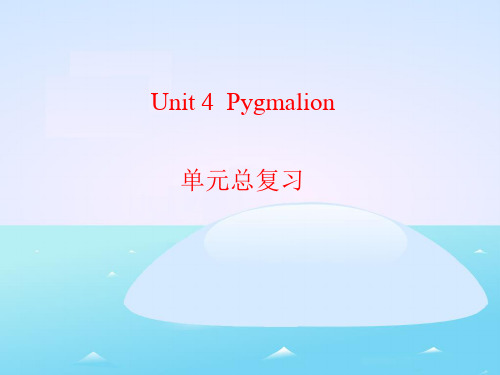
④I have some acquaintance
⑤I need to
答案: ①with
myself with the new regulations.
②make ③ acquaintances
④with
⑤acquaint
5. fortune n. [U]命运;运气;机会; [C]财产;财富 She had the good fortune to be free from illness. 她运气好,没得病。 It is believed that it will bring good fortune in the coming year. 据说它能为人们在新的一年里带来好运气。 常用结构: make a fortune发财 seek one’s fortune外出找出路 try one ’s fortune碰运气 联想拓展: fortunate adj.幸运的;幸福的 be fortunate to do sth./in doing sth. 幸运做某事
(2)完成句子 (原创) ①She knew that society would (指责) her for leaving her children. ②There was widespread international (国际谴责) of the bombing. ③He was found guilty and condemned death. (判 处死刑) 答案: (1)解析:选A。condemn谴责;符合句意。 scold 斥责;criticize批评;blame责怪。 (2)①condemn ② condemnation ③to
答案:①adapt; to ②adaptation to ③adapted to
2021高中英语Unit4课件新人教版选修8 231103

opinion,a thought,etc.about sb/sth
三、词汇拓展
1.woolen的名词 wool n.羊毛
2.uncomfortable的名词 discomfort n.不适
3.mistaken的动词 mistake vt.弄错
4.fortune的形容词 fortunate
adj.幸运的
5.brilliant
e.known to be real and genuine and not a copy
6.b sound or a musical tune by forcing
your breath out when your lips are closed
.
A.she could sell flowers to Professor Higgins
B.Professor Higgins could help her get what she wanted
C.Colonel Pickering and Professor Higgins were two cheats
Unit 4 Pygmalion
[文章导语]Pygmalion,who fell in love with his ideal woman,begged Aphrodite for a wife who would be as perfect as his statue.Aphrodite brought the statue to life and Pygmalion married her. 皮格马利翁爱上了他想象中的女子,请求阿芙洛狄特赐予自己一位 和雕塑一样完美的妻子。阿芙洛狄特赋予雕塑生命后皮格马利翁 与其结婚。
4.Professor Higgins believed that he could judge a person by
高中英语Unit4Pygmalion课时跟踪练二WarmingUp&Reading_LanguagePoints新人教版选修8
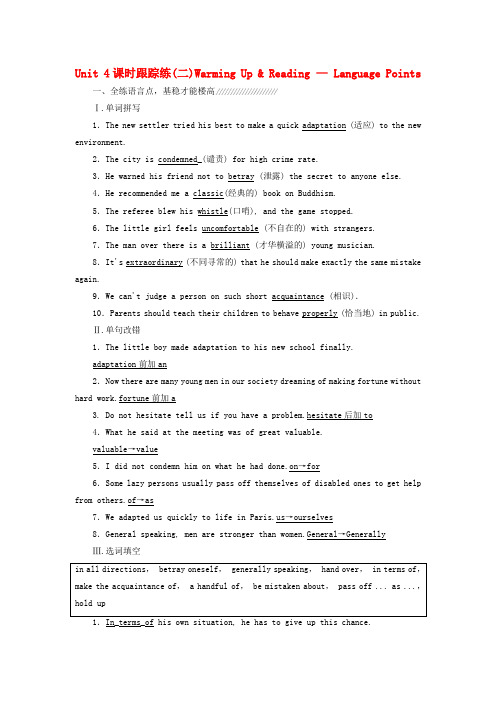
Unit 4课时跟踪练(二)Warming Up & Reading — Language Points一、全练语言点,基稳才能楼高Ⅰ.单词拼写1.The new settler tried his best to make a quick adaptation (适应) to the new environment.2.The city is condemned_(谴责) for high crime rate.3.He warned his friend not to betray (泄露) the secret to anyone else.4.He recommended me a classic(经典的) book on Buddhism.5.The referee blew his whistle(口哨), and the game stopped.6.The little girl feels uncomfortable (不自在的) with strangers.7.The man over there is a brilliant (才华横溢的) young musician.8.It's extraordinary (不同寻常的) that he should make exactly the same mistake again.9.We can't judge a person on such short acquaintance (相识).10.Parents should teach their children to behave properly (恰当地) in public.Ⅱ.单句改错1.The little boy made adaptation to his new school finally.adaptation前加an2.Now there are many young men in our society dreaming of making fortune without hard work.fortune前加a3. Do not hesitate tell us if you have a problem.hesitate后加to4.What he said at the meeting was of great valuable.valuable→value5.I did not condemn him on what he had done.on→for6.Some lazy persons usually pass off themselves of disabled ones to get help from others.of→as7.We adapted us quickly to life in →ourselves8.General speaking, men are stronger than women.General→GenerallyⅢ.选词填空.In_terms_of his own situation, he has to give up this chance.2.Generally_speaking,_we have much work to do every day.3.He passed_off himself as a policeman to cheat.4.The manager had handed_over all his work to his successor before he left his office.5.Don't be_mistaken_about the man, and he just wanted to offer a hand.6.You can't make_the_acquaintance_of the stranger on purpose.7.We invited twenty people, but only a_handful_of them came.8.In the dry weather, once the fire breaks out, it will spread in_all_directions quickly.9.The tourist guide held_up his little flag and waved it to attract our attention.10.He has a heavy accent, and once he opens his mouth, he betrays_himself.Ⅳ.课文语法填空MyFairLady was the title of a successful musical and later a film 1.based (base) on George Bernard Shaw's classical Pygmalion. In the musical, Professor Higgins takes 2.a bet from Colonel Pickering 3.that he can transfer an unrefined 4.dirty (dirt) flower girl Eliza Doolittle 5.into a lady, and fool everyone into 6.thinking (think) she really is. He does so, and t hus young aristocrat Freddy EynsfordHill falls 7.madly (mad) in love with her.When Higgins takes all the credit and forgets 8.to_acknowledge (acknowledge) her efforts, Eliza angrily leaves him for Freddy. Only then does Higgins realize he 9.has_been_accustomed (accustom) to her face and can't live 10.without her.Ⅴ.串点成篇微表达昨晚我观看了一场戏剧,是萧伯纳的一部经典(classic)小说的改编本(adaptation)。
高一英语选修8全册课件4-3

Unit 4 Pygmalion2 Nhomakorabea时间状语
①Asked why he did it, the monitor said it was his duty. 当被问及为何要做这件事时,班长说这是他的职责。 ②Approached in the dark the bulbs looked lonely and purposeless. 在黑暗走进时,那些电灯显得孤单而无意义。
人 教 版 英 语
Unit 4 Pygmalion
4)方式或伴随状语
①Surrounded by his students, the professor sat there cheerfully. 那位教授在学生们的簇拥下,兴高采烈地坐在那儿。 ②He stood there silently, moved to tears. 他静静地站在那里,被感动得热泪盈眶。
Unit 4 Pygmalion
①The signal given, the bus started.
信号一发出,汽车就开动了。 ②The football match(being) over, crowds of people poured out into the street. 足球赛一结束,人群便涌到大街上。 6)不定式与分词担任状语的差异: 1)不定式在句中可以担任目的状语,结果状语(出乎意 料的结果)以及原因状语(通常后置)。
人 教 版 英 语
Unit 4 Pygmalion
Ⅱ.与状语从句的相互转换
1)过去分词短语作时间状语,可转换为when, while或 after等引导的状语从句。 Seen from the top of the hill, the park looks more beautiful. →When it is seen from the top of the hill, the park looks more beautiful. 从山上往下看,这座公园看起来更加漂亮。
高中英语人教版选修8练习Unit 4 Pygmalion 4.2 Word版含解析

SectionⅡ—LearningaboutLanguage,UsingLanguage, SummingUp&LearningTip课后篇巩固探究一、写作词汇检测A.根据每一组的提示词,完成或者翻译句子。
1.musical(1)I spent the whole afternoon listening to .(2)这家商店出售乐器、录音带和CD等。
答案:(1)music(2)The shop sells musical instruments,tapes and CDs.2.horrible(1)The lunch I had in the restaurant was .(2)昨晚我做了一个可怕的梦。
答案:(1)horrible(2)I had a horrible dream last night.3.fade(1)The sun was setting and the light fast.(2)牛仔裤洗后会褪色。
答案:(1)was fading(2)Jeans fade when you wash them.4.shabby(1)Two days later,his vest was even ,his hair even more gray and his hands twice as dirty.(2)你穿着那些旧衣服看上去很寒酸。
答案:(1)shabbier(2)You look shabby in those old clothes.5.cream(1)I’d like to have coffee with and sugar.(2)冷面霜可以保养皮肤。
答案:(1)cream(2)Cold cream helps to keep one’s skin in good condition.B.根据图画内容及所给词语造句。
6.(stockings,shop)答案:I bought a lot of stockings in a shop.7.(acquaintance,neighbour)答案:I’ll make the acquaintance of new neighbours when in France.8.(rob)答案:The man robbed the girl of her bag.9.(sob)答案:The little boy sobbed because he didn’t find his mother.二、阅读词汇检测阅读下列句子,写出黑体词的含义。
高中英语(人教版选修8)教师用书:Unit 4 Section_Ⅲ Learning_about_Language_-_Using_Language(含答案)
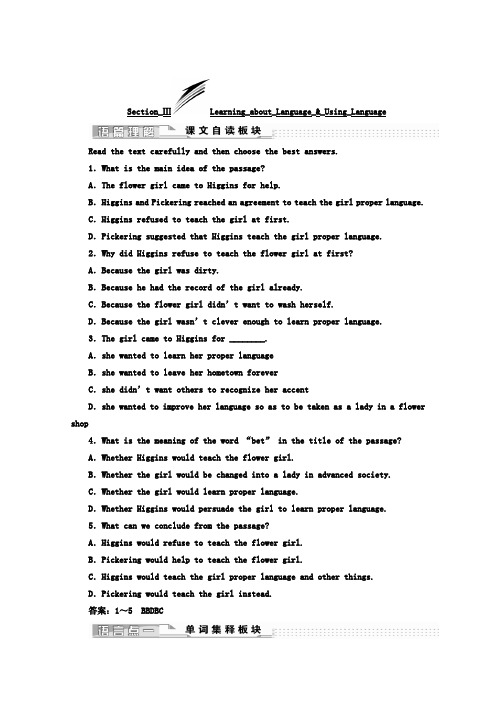
Section_ⅢLearning_about_Language_&_Using_LanguageRead the text carefully and then choose the best answers.1.What is the main idea of the passage?A.The flower girl came to Higgins for help.B.Higgins and Pickering reached an agreement to teach the girl proper language.C.Higgins refused to teach the girl at first.D.Pickering suggested that Higgins teach the girl proper language.2.Why did Higgins refuse to teach the flower girl at first?A.Because the girl was dirty.B.Because he had the record of the girl already.C.Because the flower girl didn’t want to wash herself.D.Because the girl wasn’t clever enough to learn proper language.3.The girl came to Higgins for ________.A.she wanted to learn her proper languageB.she wanted to leave her hometown foreverC.she didn’t want others to recognize her accentD.she wanted to improve her language so as to be taken as a lady in a flower shop4.What is the meaning of the word “bet” in the title of the passage?A.Whether Higgins would teach the flower girl.B.Whether the girl would be changed into a lady in advanced society.C.Whether the girl would learn proper language.D.Whether Higgins would persuade the girl to learn proper language.5.What can we conclude from the passage?A.Higgins would refuse to teach the flower girl.B.Pickering would help to teach the flower girl.C.Higgins would teach the girl proper language and other things.D.Pickering would teach the girl instead.答案:1~5 BBDBC(一)词义配对1.rob A.to fail to see or notice sth.2.overlook B.to give up some of your demands after a disagreement with sb.in order to reach an agreement3.fade C.badly dressed in clothes that have been worn a lot 4.shabby D.to steal money or property from a person or place 5.compromise E.to become or to make sth.become paler or less bright答案:1~5 DAECB(二)根据所给词性和汉语意思写出单词6.troublesome adj.带来麻烦的;使人心烦的→trouble n.麻烦;烦扰7.musical adj.音乐的→music n.音乐8.pronounce vt.发……的音→pronunciation n.发音9.horrible adj.可怕的;恐怖的→horror n.恐怖;恐惧10.disgusting adj.使人反感的;令人厌恶的→disgust vt.使人恶心;令人厌烦11.effective adj.有效的→effect n.效果;影响12.referee n.裁判员;仲裁者→refer vt.把……提交,交付,委托13.disapprove vt.& vi. 不赞成;反对;认为不好→approve v. 赞成;批准1.rob vt.抢劫;盗窃;剥夺[教材原句] someone who steals sth. or robs sb.偷盗某物或抢劫某人的人①While he was away, his hou se was robbed.他外出时,家被盗了。
- 1、下载文档前请自行甄别文档内容的完整性,平台不提供额外的编辑、内容补充、找答案等附加服务。
- 2、"仅部分预览"的文档,不可在线预览部分如存在完整性等问题,可反馈申请退款(可完整预览的文档不适用该条件!)。
- 3、如文档侵犯您的权益,请联系客服反馈,我们会尽快为您处理(人工客服工作时间:9:00-18:30)。
impatient, rude, confident, superior, self-important
2. Where has Colonel Pickering been living and what has he studied?
He has been living in India and has studied many Indian dialects.
3. Who is Henry Higgins anxious to meet and why?
and what has he studied? 3. Who is Henry Higgins anxious to meet
and why? 4. What job does Eliza want to do? What does she decide to do about it?
1. Why is Eliza frightened of him at first? She thinks he is a policeman in disguise.
She wants to be a shop assistant and she decides to learn better English from Higgins.
3. Can you recognize each character’s social position by their behaviour and language? Is he or she from the upper class, middle class or lower class? Give your reasons.
when
Fast reading
11:15,PM in 1914
where London, England
who what
Eliza, Professor Higgins, Colonel Pickering
fateful meetings
Pygmalion
Act one
Fateful meetings
Eliza Doolittle
Henry Higgins
Colonel Pickering
Comprehending
answer these questions.
1. Why is Eliza frightened of Higgins at first? 2. Where has Colonel Pickering been living
3) be convinced + of sth/ that 从句 “坚信…” 我确信他是清白的。 I am convinced of his innocence. =I am convinced that he was innocent.
2. While watching, he makes notes. 他一边观察, 一边做笔记。
2) convince sb + of sth/that 从句 “使…确信…”
我不认为她的强颜欢笑能使她父亲相信她过得很开心。
I don’t think her forced smile _w_i_ll_c_o_n_v_i_n_c_e_h__er__fa_t_h_e_r_t_h_a_t_s_h_e__li_v_e_s_h_a_p_p_i_ly_._
Behaviour: _r_e_sp_e_c_t_fu__l to people of higher class
Character Position Evidence in the play in society
Henry Higgins
Middle class
Language: calls Eliza “_y_o_u__si_ll_y_g_ir_l_” and Pickering “__m_y_d_e_a_r_m_a_n__”
Act one
Fateful meetings
Eliza Doolittle
Henry Higgins
Colonel Pickering
Eliza Doolittle(E): a poor flower girl who is ambitious to improve herself. Professor Higgins(H): an expert in phonetics, convinced that the quality of a person’s English decides his/her position in society. Colonel Pickering(P): an officer in the army and later a friend of Higgins’ who sets him a task.
Behaviour: _r_u_d_e_ to lower class; _p_o_l_it_e to same or upper class
Character Position Evidence in the play in society
Colonel Pickering
Upper class
kind, polite, generous, enthusiastic, eager, confident
anxious, eager, emotional, ambitious, unsure, dynamic
5 Suppose you have a chance to help Eliza improve her use of the English language. Correct all these sentences in terms of grammar, spelling, etc, so that she can use them properly.
A. Cleaning
B. To clean
C. While cleaning D. While I was cleaning
Language: generous to__p_ra_i_se_ by saying “that’s quite brilliant/ Extraordinary”.
Behaviour: generally confident and _p_o_li_te__
4 Choose those adjectives in the list which best describe each character in the play. In pairs discuss them and then place them in the boxes below. Some can be used more than once.
1. Come over’ere, cap’in, and buy me flowers off a poor girl.
Come over here, captain, and buy some flowers from a poor girl.
2. I ain’t done nothing wrong by speaking to that gentleman.
Unit 4
Pygmalion
Pygmalion, a gifted artist, makes a stone statue of a beautiful woman.
He asks the Greek Goddess to bring her to life.
His wish is granted.
1. Professor Higgins (H): an expert in phonetics, convinced that the quality of a person’s English decides his/her position in society.
1) convince sb to do sth说服…去 我们说服了他坐火车去, 不要搭飞机去。 We convinced him to go by train rather plane.
4. How do I know whether’ ou took me down right?
How do I know whether you took me down accurately?
5. A shop assistant? Now that’s sommat I want, that is! A shop assistant? Now that’s something I want!
▲ while watching 为while he is watching 省略句。
1) When__D___ help, one often says “Thank you.”
or “It’s kind of you.”
A. offering
B. to offer
C. to be offered D. offered
Fill in the chart.
Character Position Evidence in the play
in society
Eliza
Lower class
Language: calls gentleman “sir” and _“_c_a_p_’_in_”__ (or captain) which is a compliment
George Bernard Shaw, is an adaptation of the Greek story.
